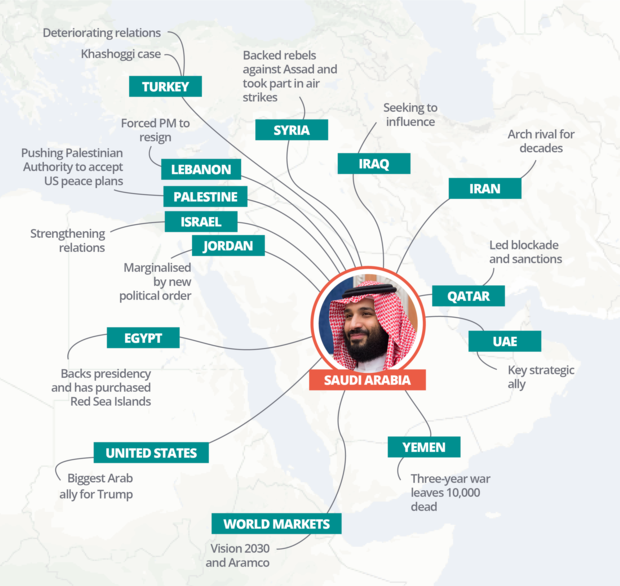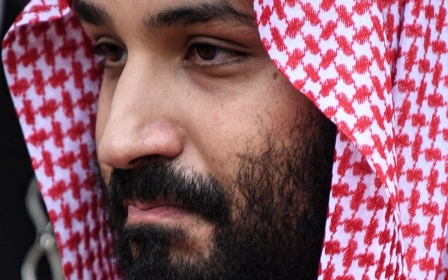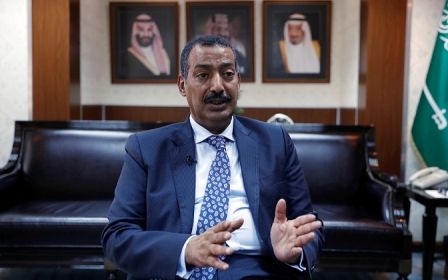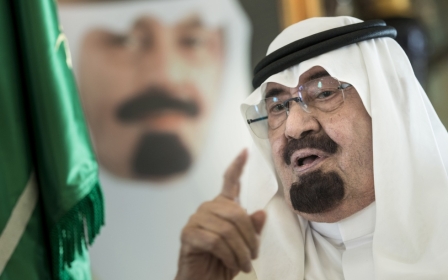Is Saudi Arabia safe in Mohammed bin Salman's hands?
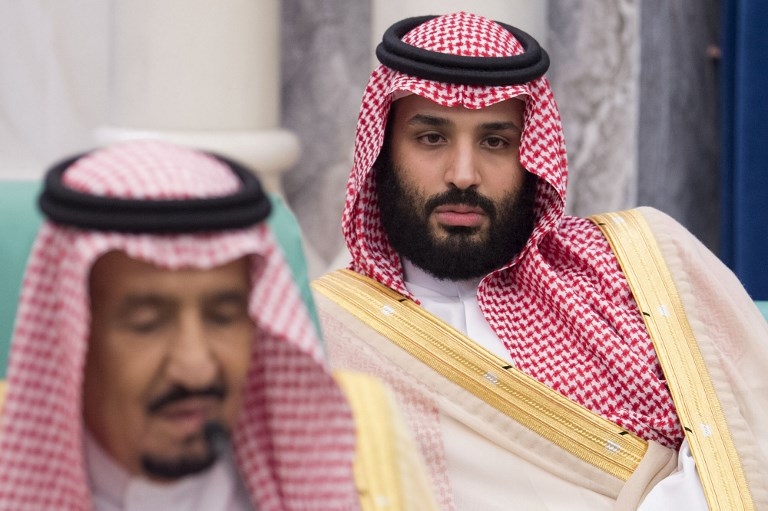
There is only one way the crisis created by the brutal murder of Jamal Khashoggi in the Saudi consulate in Istanbul will be solved and that is for King Salman to find another heir to his throne.
Try as he may to wash his hands of Khashoggi’s blood, there is no way for Mohammed bin Salman, the crown prince, to escape responsibility for this heinous and barbaric crime.
Ask yourself whether the existence of such a unit could have been unknown to a crown prince who placed five of his closest men in it and who gave it a budget for mounting complex and expensive operations on foreign soil
Today, Middle East Eye publishes the first detailed account of “Tiger Squad”, the elite unit that carried out this assassination and countless others. Read it and ask yourself whether a unit of this size, financial resources and global operational ability was indeed a “rogue” unit of which Mohammed bin Salman had no knowledge.
Firqat el-Nemr - or Tiger Squad - was formed over a year ago, comprised of 50 of the best-trained operatives from military and intelligence. Its mission is to carry out covert executions of Saudi dissidents at home and abroad.
The squad, under the direction of Major General Ahmed al-Assiri, who has now been sacked, contained five trusted members of the crown prince’s security detail, so that he would stay in direct touch with it.
The leader of the Istanbul operation, Maher Abdulaziz Mutreb, is a diplomat and major general who has travelled with MBS earlier this year on tours of Boston, Houston and the United Nations in New York. He is described in our report as "the spinal cord of the Tiger Squad". "He was chosen by bin Salman himself, who depends on him and is close to him," the Saudi source - who has intimate knowledge of the kingdom's intelligence services - told MEE.
The Tiger Squad's scalps also include Prince Mansour bin Muqrin, the deputy governor of Asir province and the son of a former crown prince, whose helicopter went down near the Yemen border in November 2017. The man who shot down the helicopter was Meshal Saad al-Bostani, who was part of the murder squad in Istanbul.
Although it was reported last week that he was announced dead in a car accident in Riyadh, a source tells MEE al-Bostani was, in fact, poisoned and killed in prison.
The president of Mecca public court, Sheikh Suliman Abdul Rahman al Thuniyan, is believed to be another victim of the Tiger Squad, which had him injected with deadly viruses while he was in hospital on a routine check earlier this month.
Ask yourself whether the existence of such a unit could have been unknown to a crown prince who placed five of his closest men in it and who gave it a budget for hiring private planes and mounting complex and expensive operations on foreign soil.
The one question that matters
Khashoggi’s murder has transcended questions of foreign policy shaped by values of democracy, free speech, and due process. The Khashoggi killing raises questions of cold, unblinking realpolitik.
Three weeks into this affair and with the overwhelming evidence from the Turkish inquiry and intelligence from US and British services, world leaders have only one question to ask themselves: is Saudi Arabia safe in the crown prince’s hands?
The kingdom is not Libya under Gaddafi. Nor is it Syria under Bashar al-Assad. It is the world’s largest oil producer. It is the region’s richest nation.
For better or worse (mainly worse), it is the key Arab state. In the wrong hands, Saudi Arabia has already proved that it can determine the fate of presidents in Egypt, kidnap prime ministers from Lebanon, attempt coups in Qatar and, when that fails, blockade it. It can start wars in Yemen.
The man who runs such a country is therefore a vital strategic Western interest. It is important that he is mentally stable.
The first intelligence agency to highlight bin Salman's potentially unstable nature was Germany's Federal Intelligence Service - the Bundesnachrichtendienst (BND).In December 2015, when MBS was still only a defence minister, and when his cousin Mohammed bin Nayef was crown prince, the BND took the unusual step of publishing an assessment warning of the dangers the then 29-year-old prince posed.
"The careful diplomatic stance of older members of the Saudi royal family has been replaced by an impulsive policy of intervention," the BND said.
In June last year, I dubbed Prince Salman the prince of Chaos. The question the US and Britain have to ask themselves is whether they really are ready to deal with Saudi Arabia as the Kingdom of Chaos.
After the serial disaster of Western intervention in the Middle East and the collapse of Yemen, Libya, Syria and the near collapse of Iraq, the overwhelming objective of all Western nations must be to have leaders who can ensure stability.
Only when the three regional hegemons - Turkey, Iran and Saudi Arabia - reach some sort of accommodation with each other, will the proxy wars raging throughout the region calm down. Only then will national foes reach some accommodation, and governments of national unity can start to rebuild nations shattered by a decade of more or less constant conflict.
Is this likely to happen under a future King Mohammed?
The accidental heir
That future king, the current crown prince, is an accidental heir to the throne. He is only in pole position by dint of his father, and as I reported in my columns on the palace coup that took place when King Abdullah died, MBS’s accession to the throne very nearly did not happen.
Bin Salman faced huge obstacles getting himself taken seriously when he arrived on the scene. He has only surmounted them by ruthlessly eliminating rival centres of power, putting all three of Saudi Arabia’s armies under his personal control, and by taking all decision making into his hands.
This history leaves the small army of advocates he has installed in the US arguing positions that are mutually contradictory. The first is "give the guy a chance, because he is inexperienced".
Ali Shihabi, founder of the Arabia Foundation tweeted this three days ago: "To expect Mohammad bin Salman (MBS), a young leader with only a few years of experience, to have handled such a political calamity with the virtuoso performance of a seasoned, wise, experienced Western politician is unfair and malicious.”
But in the next breath, Shihabi argues that to change a crown prince with proven problems is to risk the stability of the kingdom.
“Stability and continuity are absolutely paramount. And MBS is going nowhere. A change in leadership would put the country, already surrounded by peril, into inconceivable turmoil, giving rise to political jockeying and possible risk of collapse.”
It is surely the other way round: to keep bin Salman in the leadership is to risk throwing a country surrounded by peril into inconceivable turmoil.
You can all keep your bloodstained and deeply comprised arms industries, which are equipping the dictators of the world. There will just be a different prince at the helm
Just imagine what bin Salman would do if he gets away with Khashoggi’s murder, if Trump continues to insist the Saudi cover story is credible, if King Salman manages to persuade the world that his son is on a sharp learning curve and that after a sharp wrap over the knuckles, the errant boy has given him his word he won't do such a thing ever again.
If this happens, MBS will unleash a reign of terror in the kingdom. Literally nothing will be out of bounds if he emerges from this scandal unscathed.
There are alternatives to him, many princes who are more experienced, more stable, and who have the support of the family and the nation. One of them is in London at the moment: Prince Ahmed bin Abdulaziz, a former deputy minister of the interior who is popular, less adversarial and could re-establish unity within the family.
No lost arms contracts, no job losses at BAE Systems. You can all keep your bloodstained and deeply comprised arms industries, which are equipping the dictators of the world. There will just be a different prince at the helm.
This is, of course, Saudi Arabia’s sovereign choice. But that choice would be easier to make if the leaders of the Western world refused as one to deal with bin Salman, if they determined to make him a pariah on the international stage.
So that the next time he turns up in London, it would not be to march, gowns flowing in the direction of 10 Downing Street. It would be to be interviewed under universal jurisdiction for crimes against humanity by the Metropolitan Police’s anti-terrorist squad.
- David Hearst is editor-in-chief of Middle East Eye. He was chief foreign leader writer of The Guardian, former Associate Foreign Editor, European Editor, Moscow Bureau Chief, European Correspondent, and Ireland Correspondent. He joined The Guardian from The Scotsman, where he was education correspondent.
The views expressed in this article belong to the author and do not necessarily reflect the editorial policy of Middle East Eye.
Photo: Mohammed bin Salman in Mecca in June (AFP)
New MEE newsletter: Jerusalem Dispatch
Sign up to get the latest insights and analysis on Israel-Palestine, alongside Turkey Unpacked and other MEE newsletters
Middle East Eye delivers independent and unrivalled coverage and analysis of the Middle East, North Africa and beyond. To learn more about republishing this content and the associated fees, please fill out this form. More about MEE can be found here.



